When a movie
music fan thinks of a composer such that employs, for every
work of him, never mind the quality of the scored movie, a great
piece of talent and genious, that could not be overpassed, he
always thinks of people like Bruce Broughton, Patrick
Doyle, or Wojciech Kilar.
The composer currently targeted by our attention, Lee Holdridge,
could be perfectly included in this group of composers, always constant regarding
the quality of their scores.
The day Lee granted us this interview was one of the happiest
in my life. The reason is simple. I've grown up with his amazing score composed
for the cult movie, "The Beastmaster". To know
that, at the opposite edge of the e-mail, I was meeting its creator, and
a composer bigger than life, was an unforgetable experience.
But that's not all. Lee speaks a perfect Spanish, and then
our meeting was very fluid. He demonstrated to be a very humble and nice
person.
This interview you're going to read is, may be, one of the best interviews
granted to BSOSpirit. And this is not because of the interviewer,
but the interviewed, as he is person with we could talk about his life, and
his long and great career as a musician.
 BSOSpirit
(BS): Before anything, thank you very much for granting
us this interview, Maestro. Here in Spain, there are legion
the movie music fans that enjoy so much your music.
BSOSpirit
(BS): Before anything, thank you very much for granting
us this interview, Maestro. Here in Spain, there are legion
the movie music fans that enjoy so much your music.
How did your interest
in music begin, and concretely, in movie music?
Lee Holdridge
(LH): I grew up in Costa Rica and at the age of 10 I developed
a great interest in the violin. I started taking lessons and by
the time I was 12 all I wanted to do was compose. I talked my
parents into sending me to Boston to live with an uncle and aunt
during the school year so I could study music. There I studied
composition privately with Henry Lasker. By the time I was 18
I had composed a short piano concerto, a three movement ballet
and several string orchestra works. I went to New York to go to
college and there I met composer Nicolas Flagello who I also studied
with. Nicolas was my introduction to film music as he had orchestrated
portions of Dr. Zhivago for Maurice Jarre. I simultaneously was
becoming a complete film buff. It was natural to develop a strong
desire to compose for film.
BS:
How much is composition due to talent or training? Tell us of
your studies with Henry Lasker.
LH: You have
to have the innate talent for composition to begin with. You have
to have a hunger for it that will simply not go away. Then comes
the hard part, learning and developing the technique to be able
to carry out and execute your ideas. Whoever said 10% inspiration
and 90% perspiration wasn’t far off. I think having a strong
symphonic background helps enormously in being able to carry out
the inspiration. Henry Lasker
was very instrumental in my early formation of compositional and
orchestration techniques. He also loved music and made it joyous
to study and learn.
BS:
As a violinist, which element or elements do you consider that
set this instrument above so many others?
LH: What
I learned from playing the violin is the value of linear thinking
to your composition and orchestration. This makes a huge difference
in how you write for the orchestra. You hear lines against each
other. Having played the violin or any linear instrument really
gives you an ear for that contrapuntal and melodic sensibility.
BS:
Tell us a bit about your origins in this world, and about your
first works.
LH: My first
professional work began in New York. I started working in the
Broadway theater as an arranger and a songwriter. From there I
began to arrange records for pop artists on RCA records. One arrangement
I wrote of a Neil Diamond song attracted the attention of Neil
Diamond and his producer. They brought me out to Los Angeles to
write some arrangements for them. Many great albums and hit records
followed and this opened the doors to movies and televisión
for me.
BS: Do  you admit some special influence in your style?
you admit some special influence in your style?
LH: My influences
are primarily classical composers. But I have been very influenced
by contemporary symphonic composers like Bartok, Shostakovich
and Vaughn Williams. I also have been very influenced by the film
composers like Korngold, Waxman, Goldsmith and Morricone.
BS:
One of the first movies you scoerd was Jeremy,
a teenager romantic story that was recently released in an interesting
DVD edition. What can you remember about this work? What can you
tell us about your experience in this film, about the sounds you
employed in this score?
LH: This was
one of my early scoring assignments. As the film was about a young
cellist, I featured the great New York cellist George Ricci as
a soloist with a chamber string, woodwind and piano ensemble,
occasionally adding percusión and bass for a more pop feel.
The Concertino for Cello and Strings of mine I created out of
several of the cues from the movie.
BS: 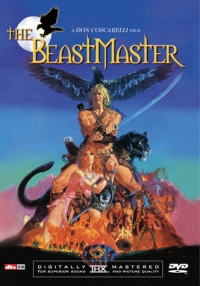 The
Beastmaster is maybe the work which has granted you
the greatest number of fans. How did you get involved in the
project?
The
Beastmaster is maybe the work which has granted you
the greatest number of fans. How did you get involved in the
project?
LH: The director
Don Coscarelli had heard a CD of my Violin Concerto and loved
the music. He contacted me about writing the score for his movie.
I was very excited about writing for this action adventure genre.
The bad news was I had to do it in 2 weeks. The total was 1 hour
and 15 minutes of music! 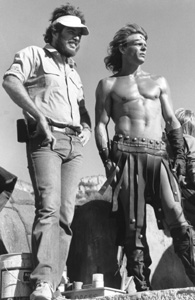 I
managed to get it done with brilliant orchestration help from the
legendary Greig McRitchie, who had orchestrated for Alfred Newman
and Jerry Fielding, and my friend Alf Clausen. Needless to say, I
did not sleep much for two weeks. I then jumped on a plane to Rome
to record for 5 days.
I
managed to get it done with brilliant orchestration help from the
legendary Greig McRitchie, who had orchestrated for Alfred Newman
and Jerry Fielding, and my friend Alf Clausen. Needless to say, I
did not sleep much for two weeks. I then jumped on a plane to Rome
to record for 5 days.
BS:
The truch is that you had to compose a huge amount of music in
a very little time. Did you have a similar situation later, where
your composition had such a deadline?
LH: Through
out my career there have been many moments of extremely tight
deadlines. The Beastmaster was one of the tightest.
For the 1 hour pilot of The Beauty andthe
Beast series, I had 4 days to write 25 minutes of music.
BS:
How was your relation with director Don Coscarelli?
LH: I found
Don to be a terrific director and very oriented towards music
and what he wanted the score to do for the film. I regret we have
not had the opportunity to work together again.
BS:
Did you meet some of the main actors, personally?
LH: I rarely
get to meet the actors as the score is always worked on after
the film is shot. However, my biggest excitement was having Gregory
Peck come to one of the sessions for “Old Gringo” .
BS: 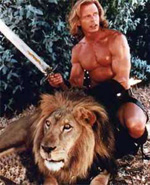 What do you think of the movie The Beastmaster,
what is your personal opinion?
What do you think of the movie The Beastmaster,
what is your personal opinion?
LH: I love
writing action adventure. “The Beastmaster” fits right
into that genre. It’s definately a composer’s genre
because the composer can turn his imagination loose. He doesn’t
have to underplay he can really let the music be a major character.
BS: 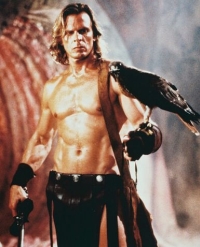 How did you create the mythical Dar's theme?
How did you get the inspiration?
How did you create the mythical Dar's theme?
How did you get the inspiration?
LH: The Dar
theme is the main theme of the movie. I went for a heroic and
rousing theme, something that would sound especially good with
french horns and brass.
BS:
I found amazing the scene where Dar runs along
the dry lands, together with the eagle, waving his sword in a
martial exercise. "The Sword & The Eagle/ The
Epic Begins" may ge one of the best tracks in the
score edition. With this views, it is easy to be inspired, isn't
it?
LH: I loved
the mysticism of the animals being Dar’s eyes and ears.
I gave the eagle his own theme, which is the soaring theme you
hear.
BS:
Did you get inspired by Basil Poledouris's Conan
the Barbarian, when you were writing the score? Did you
borrow some sounds as references?
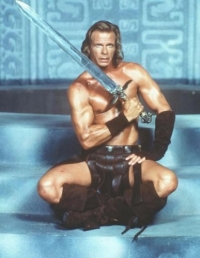 LH: Actually,
Basil and I did our scores at just about at the same time. I liked
his score very much. I think both he and myself were influenced
quite a bit by the Russian composers Borodin and Mussourgsky.
LH: Actually,
Basil and I did our scores at just about at the same time. I liked
his score very much. I think both he and myself were influenced
quite a bit by the Russian composers Borodin and Mussourgsky.
BS: Princess
Kiri's theme is dramatically beautiful. It resembles
of a medieval music theme, in fact. What can you say about it?
LH: I did
mean Kiri’s theme to have a medieval quality about it. Putting
it in 3/4 set it apart from the rest of the score.
BS: The
Beastmaster's score is embellished with a large variety
of "themes". This in fact charaterized most
of the scores released in past 80's: Conan The Barbarian, The
Empire Strikes Back, The Rescuers Down Under,
etc. Currently many fans miss this thematic diversity in recent
compositions. Do you think that, in the last times, a more complex
instrumentation, more sofisticated sounds are preferred, on
behalf of the composition background and thematic diversity?
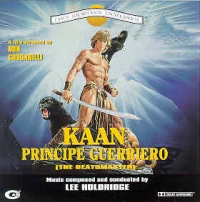 LH: It’s
true that there are less “themes” these days than
there used to be. It’s just the mode of the moment. I think
it’s harder to write themes. The influence of the minimalists
on music today is that everyone is going more for an effect or
a pattern rather than a thematic statement. It’s just the
style of the current time.
LH: It’s
true that there are less “themes” these days than
there used to be. It’s just the mode of the moment. I think
it’s harder to write themes. The influence of the minimalists
on music today is that everyone is going more for an effect or
a pattern rather than a thematic statement. It’s just the
style of the current time.
BS:
Only one official edition for The Beastmaster was
released, thanks to Cam Records. Moreover, there
is a promotional edition including also your Beauty and
the Beast score. But the official edition is very hard
to find, actually. Now comes the usual fan question. Have you
thought of a re-edition of this amazing score, remastered and
with previously unreleased matherial?
LH: That’s
a good idea actually. Maybe I’ll see if I can do something
about that.
BS:
You were not considered for the The Beasmaster sequel,
even after the good results obtained by your score for the first
movie. Why?
LH: I’m
not sure why I wasn’t involved in the second “Beastmaster”.
Of course, neither was the director.
BS:
Have you listened Robert Folk's score for the
sequel?
LH: I can’t
really say I’ve ever seen the 2nd movie.
BS:
It's 1983 and you scored one of your best works, in my opinion.
Epic sounds, plenty of sensitivity, highly attached to the ground. El
Pueblo del Sol is a unique masterpiece that any movie
music fan must rediscover. How did you get involved in this documentary
production?
LH: The Mexican
Government was looking for a composer to score their first Omnimax
film for their new museum in Tijuana. I was approached to do the
score based on the reputation of my other scores. I loved the
idea of composing for this 360 degree panoramic film. There was
going to be very little dialogue and they wanted the London Symphony
Orchestra. I jumped at the opportunity. I created a score that
is very much a symphonic tone poem and can be listened to like
a symphony. Yet, it scores the film. It worked out very well.
This CD is going to be re-released in the near future.
BS:
You look very comfortable when composing for documentaries, do
you agree?
LH: I treat
documentary films as if they were dramatic films. I make the music
really mean something to the subject and to the emotions in the
film.
BS: El
Pueblo del Sol, Splash and The
Beastmaster were all composed in the 80's. Could be
that your best age?
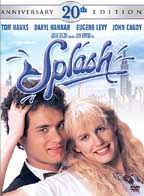 LH: They
are great scores, but I am still only warming up. After all,
the 90s bro
LH: They
are great scores, but I am still only warming up. After all,
the 90s bro ught “The
Tuskegee Airmen”, “The
Mists of Avalon”, “Buffalo Girls”, “Into
Thin Air” and “The Long Way Home”.
ught “The
Tuskegee Airmen”, “The
Mists of Avalon”, “Buffalo Girls”, “Into
Thin Air” and “The Long Way Home”.
BS:
In 1984 you composed one of your best considered scores: Splash.
What can you tell us about this project?
LH: I had
worked with Ron Howard on two of his television projects. I auditioned
for “Splash” and got the movie. It’s a wonderful
film. I composed a lot more music for the film than what was used,
but it still was a success.
BS:
How was your relation with Ron Howard?
LH: We worked
well together, but “Splash” went through a lot of
changes to arrive at the final product. Still, it was a great
experience.
BS: Splash may
be one of your most varied scores. How could it be explained?
LH: I always
try to do something a different with each score I do. If you put “Splash”, “The
Beastmaster”, “Old Gringo” and “Into Thin
Air” side by side, the contrast is striking.
BS:
Also, Splash is only available in a very hard
to find promotional edition? Do you see an official edition in
the near future?
LH: We are
trying to get the rights to re-issue the Royal Philharmonic recording
of the score.
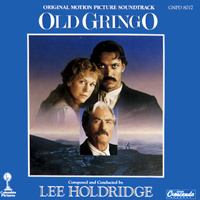 BS: In 1989 you scored Old Gringo, one of your
most acclaimed works by the critics.
Tell us something about your implication in this movie, and
your relation with director Luis Puenzo.
BS: In 1989 you scored Old Gringo, one of your
most acclaimed works by the critics.
Tell us something about your implication in this movie, and
your relation with director Luis Puenzo.
LH: I had
a really good working relationship with Luis Puenzo. We understood
and cared very deeply about the material and the story. However,
the studio eventually took over the film and re-edited a lot of
his ideas. I feel some of the originality of the film was lost
by the studio in their changes.
BS: 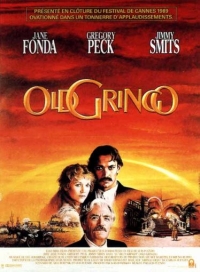 Did
these changes affected your work, making necessary to re-record
new music for the subsequent re-editings?
Did
these changes affected your work, making necessary to re-record
new music for the subsequent re-editings?
LH: I started scoring Old
Gringo and then had to stop as the
studio decided to re-edit the film. I was given a month off. I
then returned to the newly edited version and finsihed scoring
that one. I did go back and re-do a couple of cues to fit the
new timings. For example Harriet’s Theme on
the CD, the love theme is the original longer version. The one
currently in the film is a shorter version of that cue.
BS: Old
Gringo comprises original music but also some traditional
cues. How do you decide which proportion of original and traditional
music will be in the final score?
LH: It just depended
on the scene. Going into Chihuahua in the movie I played the traditional
melody Las TresPelonas to make the sudden change
from the United States. I recall a variation of that melody later
for the Mirrors Scene. However, most of the score is original.
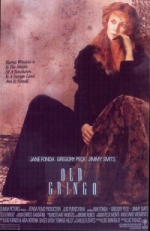 BS: Which
of the different themes composed for each character in Old
Gringo was the most difficult to create?
BS: Which
of the different themes composed for each character in Old
Gringo was the most difficult to create?
LH: There is
a theme for each main character. All three themes are presented
right at the beginning in the Main Title. The main overall theme
is Harriet’s Theme, the Jane Fonda character, which becomes
the love theme for the film. I composed the three themes together
so there would be a coherence to the score.
BS: 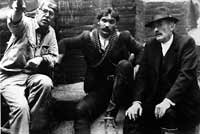 Can be Old Gringo one of your prefererd works?
What do you specially appreciate of this score?
Can be Old Gringo one of your prefererd works?
What do you specially appreciate of this score?
LH: I like
the score a lot, for the mood and thematic elements and the orchestration.
I also love mixing the Mexican style into the score both by quoting
some traditional melodies as well as creating my own original
melodies. Each character has their own theme and the three themes
are played off of each other through out the score.
BS:
In 1990, you scored The Dreamer of Oz, a melodic
and varied work for a television movie. What do you remember of
this project?
LH: I love
that film and I love that score. There is a CD available now for
that film. It’s a great story. We felt it should be an original
score that told the story of the author, not to be confused with
the score for the movie.
BS: 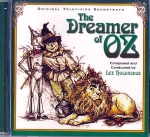 Why nothing of the previous matherial composed by Harold
Harlen for the classic The Wizard of Oz was
employed? Was your decision, or copyright problems?
Why nothing of the previous matherial composed by Harold
Harlen for the classic The Wizard of Oz was
employed? Was your decision, or copyright problems?
LH: We did
not have the rights to show any of the MGM film.
BS: The
Dreamer of Oz CD Edition is simply espectacular. An
extensive booklet with a delightful design and very nice pictures.
Who was responsible of the music and contents included in the
CD?
LH: This
CD is thanks to Taylor White. He loved the film and the score
and was able to put together the rights for the art work and the
CD. I’m thrilled that he accomplished this feat. It’s
a wonderful CD.
BS:
1991 marks an important hit in your career, Pastime,
a very beautiful score witn and eminent american sound. Tell us
about this work.
LH: “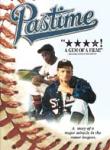 Pastime” is
a wonderful film by a first time director. It was a tricky film
to do because being independently produced, the budget was tight
and the time was limited. Still we got a very emotional result
and a beautiful film.
Pastime” is
a wonderful film by a first time director. It was a tricky film
to do because being independently produced, the budget was tight
and the time was limited. Still we got a very emotional result
and a beautiful film.
BS:
Being Pastime a low budget production, how did
you compose an orchestral score, knowing the high cost of this?
LH: Pastime did
not have a lot of music in it. We were able to do it all in two
recording sessions. One with a larger 45 piece group and one with
a smaller group. This way we were able to make the budget work.
BS: 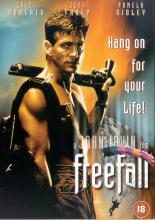 It's
1994 and you compose the score for Freefall,
a John Irvin's adventure thriller, starring Eric
Roberts. Great leitmotivs and, again, a musical flavour
very related to the ground and the landscape. What do you remember
about Freefall? You employed some electronical
instrumentation, something that we already noticed in other
of your works. When do you decide what type of instrumentation
apply? When do you consider that one particular type of instrumentation,
electronical in this case, matches better with the images?
It's
1994 and you compose the score for Freefall,
a John Irvin's adventure thriller, starring Eric
Roberts. Great leitmotivs and, again, a musical flavour
very related to the ground and the landscape. What do you remember
about Freefall? You employed some electronical
instrumentation, something that we already noticed in other
of your works. When do you decide what type of instrumentation
apply? When do you consider that one particular type of instrumentation,
electronical in this case, matches better with the images?
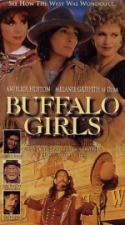 LH: I
liked the thriller-romantic aspect of “Freefall”.
I liked going between the more romantic orchestral textures and
the more stark electronic textures to contrast the plot of the
movie.
LH: I
liked the thriller-romantic aspect of “Freefall”.
I liked going between the more romantic orchestral textures and
the more stark electronic textures to contrast the plot of the
movie.
BS:
For the TV movie Buffalo Girls (1995), starrring Anjelica
Huston, and directed by Rod Hardy, you
composed a very sticky main theme. What can you tell us about
your experience in this film?
LH: I loved
working with Rod Hardy. He would really get me fired up about
the score. The theme for “Buffalo Girls” came right
out of my meetings with Hardy. I thought it worked great. Most
of the early cowboys in America were Irish immigrants, so the
early cowboy music has a distinctive Irish flavor to it. I tried
to keep that feeling in “Buffalo Girls” .
BS: 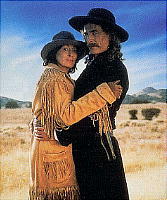 Also on this year, you composed for another western, Gunfighter´s
Moon. What are the main differences between these two
works? Do you enjoy composing for westerns?
Also on this year, you composed for another western, Gunfighter´s
Moon. What are the main differences between these two
works? Do you enjoy composing for westerns?
LH: I love
writing for westerns. The contrast between “Buffalo Girls” and “Gunfighter’s
Moon” is pretty intruiging. They are two very different
films, thus the scores are different. I liked using exotic ethnic
percussion and electronic colors for the “Gunfighter’s
Moon” score. It added a darker, colder element to the atmosphere.
BS: 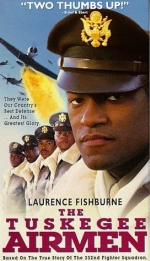 The
Tuskegee Airmen is a fabulous work from the middle
90's where we find related soldiers stories, airplane flights
and aerial battle scenes. What can you remember about it?
The
Tuskegee Airmen is a fabulous work from the middle
90's where we find related soldiers stories, airplane flights
and aerial battle scenes. What can you remember about it?
LH: I was very inspired by the film. My director friend Robert
Markowitz made an excellent film and I thought the acting
was extraordinarily good, especially Laurence Fishburne. The
story is remarakble, all the incidents in the movie are based
on true stories. The fact that these men fought bravely for
their country despite prejudice and injustice against them
is a remarkable story that was very inspiring.
BS: 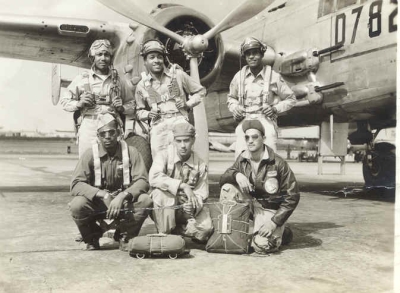 "The
First Lady Takes a Plane Ride" is a great track,
only found in the promotional CD. What is the origin of this
theme?
"The
First Lady Takes a Plane Ride" is a great track,
only found in the promotional CD. What is the origin of this
theme?
LH: It is
known historically that First Lady Eleanor Roosevelt helped instigate
the real Tuskegee Airmen being sent into action. This scene in
the movie is that moment. The music gives the sense of that great
destiny being fullfilled.
BS:
In 1998 you touched the animation genre, concretely in The
Secret of NIMH 2: Timmy to the Rescue. What kind of challenges
do you encounter here that could not be found in a real action
movie?
LH: Though
I had been exposed to animation before with my score for “American
Pop”, “The Secret of Nimh 2” was a more traditional
approach to an animated film, complete with original songs by
Richard Sparks and myself. The experience was a lot of fun and
very creative. I love animation, so I felt right at home.
BS:
Being this movie the sequel of The Secret of NIMH,
did you take into account the original score from the first movie,
composed by Jerry Goldsmith, in order to create
a composition for this movie?
LH: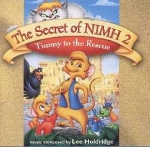 I knew Jerry Goldsmith’s score for the earlier “Secret
of Nimh”. I thought it was quite good. It was darker as
fit that particular story. I really went my own way with part
2 as the film was quite different. Both scores were orchestral.
I knew Jerry Goldsmith’s score for the earlier “Secret
of Nimh”. I thought it was quite good. It was darker as
fit that particular story. I really went my own way with part
2 as the film was quite different. Both scores were orchestral.
BS:
This score has a really good edition. Did you supervise it by
yourself?
LH: The CD
was overseen and produced by Richard Kaufman. I like the CD a
lot. The recording is really well done.
BS:
Why are so many promotional and bootleg edition for your so good
scores, and so few official editions?
LH: It’s
very expensive to make commercial or promotional CDs these days.
Record companies are discouraged about releasing soundtracks because
they are not selling as well as they use to. It’s up to
the small specialty labels to keep the genre going. They are doing
as much as they can.
BS: 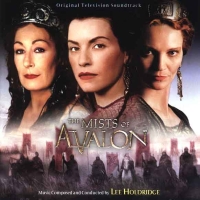 The
Mists of Avalon is one of your last works, acclaimed
by both public and critics. What kind of sensations did you
feel when you realize that your work was again so praised
and reknown?
The
Mists of Avalon is one of your last works, acclaimed
by both public and critics. What kind of sensations did you
feel when you realize that your work was again so praised
and reknown?
LH: There
was a lot of interest in “The Mists of Avalon” due
to the fact that the novel had been very popular. It’s also
a fascinating subject matter. People never tire of it. This was
yet another point of view onthe subject. It is a story that’s
natural for music.
BS: The
Mists of Avalon features a large variety of themes:
celtic, oriental sounds... This would carry a lot of preproduction
and documentation before the composition, wouldn't it? How much
time did you have?
LH: I spent
10 weeks composing and orchestrating “The Mists of Avalon”.
During that time I pre-recorded the voice, the Esraj, the Indian
stringed instrument I used and several electronic effects I incorporated
into the score. I then went to Munich and recorded the orchestra,
exotic percussion, choir and celtic instruments.
BS:  It is conformed by three chapters of 60 minutes each one. How
much music did you compose for The Mists of Avalon?
It is conformed by three chapters of 60 minutes each one. How
much music did you compose for The Mists of Avalon?
LH: My total
composition for “The Mists of Avalon” was 2 hours
and 20 minutes of music.
BS:
How was the relation with director Uli Edel?
LH: I worked
well with Uli Edel. He came to the house a few times and listened
to themes, but then he admitted that he would not be at the recording
sessions. The person I spent the most time with and who had the
most input was Mark Wolper, the producer. We had a very good working
relationship.
BS: The 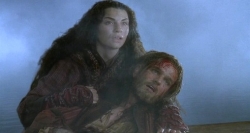 score is notably improved by the choral mass. What do you
remember of your collaboration with the chorus and solists?
score is notably improved by the choral mass. What do you
remember of your collaboration with the chorus and solists?
LH: Every
now and then a project lends itself to choir. This was definately
one of them. I love adding that element to the score. It brings
a very different, almost opera-oratorio quality to the score.
BS:
Let us talk now about the boys of the war documentaries: The
Long Way Home and Into the Arms of Strangers.
How did you get involved in these projects?
LH: I’ve
been very fortunate to become the composer for Moriah Films of
the Simon Wiesenthal Center. This began with the excellent documentary “The
Long Way Home” which won the Academy Award for best documentary
feature in 1997. I was brought into the project by producer/writer
Richard Trank and director Mark Jonathan Harris. This was followed
by Warner Bros. “Into the Arms of Strangers: Stories of
the Kindertransport” also directed by Mark Jonathan Harris,
which also won the Academy Award for best documentary feature.
More recently I composed the score for “Unlikely Heroes” for
Richard Trank and Moriah Films. This score is now also available
on CD.
BS: 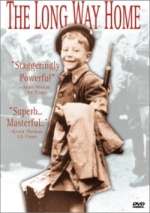 What is the main difference between the cited works?
What is the main difference between the cited works?
LH: El tema
del Holocausto es muy difícil para componer. Me impliqué tanto
emocionalmente en las historias y los sucesos que tienen lugar
que puse mucho sentimiento en los scores. Tanto The Long
Way Home como Unlikely Heroes tienen
bandas sonoras profundamente emotivas que siguen la narración
y la historia. Into the Arms of Strangers: Stories of
the Kindertransport también tiene una música
profundamente emocional, pero vista desde una perspectiva más
infantil, dado que la historia trata de niños. Utilizamos
muchas canciones infantiles de la época como parte de la
banda sonora. Ese tema principal es uno de mis favoritos.
BS:
Tell us about the documentary Into Thin Air.
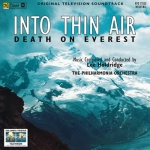 LH: The subject matter of the Holocaust is very difficult to compose
for. I become so emotionally involved in the stories and the events
that took place that I put so much feeling into the scores. “The
Long Way Home” and “Unlikely Heroes both have deeply
emotional scores that follow the narrative and the story. “Into
the Arms of Strangers: Stories of the Kindertransport” also
has the deep emotional music, but seen with a more childlike quality
as the stories are about the children. We used a lot of actual
children’s songs from the period as part of the score. That
main theme is one of my personal favorites.
LH: The subject matter of the Holocaust is very difficult to compose
for. I become so emotionally involved in the stories and the events
that took place that I put so much feeling into the scores. “The
Long Way Home” and “Unlikely Heroes both have deeply
emotional scores that follow the narrative and the story. “Into
the Arms of Strangers: Stories of the Kindertransport” also
has the deep emotional music, but seen with a more childlike quality
as the stories are about the children. We used a lot of actual
children’s songs from the period as part of the score. That
main theme is one of my personal favorites.
BS:
What is the difference between Into Thin Air and
the other documentaries you have composed for?
LH: “Into
Thin Air” is a very harrowing story. The characters are
thrust into situations they cannot control. The movie is very
gripping and relentless.
BS:
You have also some projects separate from movie music. Tell us
about your composition Concerto for Violin & Orchestra.
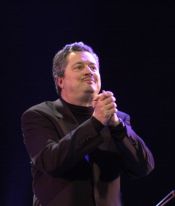 LH: My career as a composer began in the concert hall and I have managed
to continue composing for that medium, despite my intense film
and television career. The Violin Concerto was very important
to me as I had been a violinist and I wanted to pay homage to
that literature and to my music teachers who I grew up with. I
have been fortunate to compose many works for the concert hall
including my orchestral works “Jefferson Tribute”, “The
Golden Land” and my soon to be premiered “Ode to Orion”.
I have also composed 4 one act operas for the Los Angeles Opera
Community Outreach Program including “Journey to Cordoba” .
LH: My career as a composer began in the concert hall and I have managed
to continue composing for that medium, despite my intense film
and television career. The Violin Concerto was very important
to me as I had been a violinist and I wanted to pay homage to
that literature and to my music teachers who I grew up with. I
have been fortunate to compose many works for the concert hall
including my orchestral works “Jefferson Tribute”, “The
Golden Land” and my soon to be premiered “Ode to Orion”.
I have also composed 4 one act operas for the Los Angeles Opera
Community Outreach Program including “Journey to Cordoba” .
BS:
Tell us somthing about "Journey to Cordoba".
How did the idea for this composition raise? Which instruments
lead the composition? What are you trying to say with it?
LH: In 1994,
the Los Angeles Opera asked me to come up with a one act opera
based on a Hispanic subject for high school and college students
to be performed in english. The Mexican folk legend “La
Mulata de Cordoba” proved to be the ideal story as the basis
for the opera. My librettist, Richard Sparks, adapted the story
into a contemporary setting as a story within a story. The work
is scored for4 principal singers, chorus and 5 instruments and
takes one hour to perform. The work has been very successful and
to date the L.A.Opera has performed the work over 80 times in
high schools and community thatres around Southern California.
BS:
When will "Ode to Orion" be released?
LH: “Ode
to Orion” will be premiered in Dallas with the Dallas Symphony
Orchestra at the Meyerson Hall on April 22 of this year. Richard
Kaufman is the conductor and Gregory Hustis the horn soloist.
Below is the press release being
sent out about the premiere:
COMPOSER
LEE HOLDRIDGE
COMMISSIONED
BY THE DALLAS SYMPHONY ORCHESTRA
TO
CREATE A NEW PIECE “ODE TO ORION”
PREMIERING
ON APRIL 22ND
(Los
Angeles) The Dallas Symphony Orchestra has announced they have
commissioned
award
winning composer Lee Holdridge to compose an original 9 minute
concert piece for French horn and symphony orchestra “Ode
To Orion,”for their principal horn player Gregory Hustis.“Ode
To Orion”will have its premiere in Dallas at the Meyerson
Symphony Center on April 22ndand will be conducted by Richard
Kaufman.Additional performances will take place on April 23rd
and 24th.
Mr.
Holdridge has an extensive repertoire of concert works performed
and recorded including “The Golden Land”which was
commissioned and performed by the California Symphony in 2000; “Jefferson
Tribute,”a work for narrator and orchestra for the National
Symphony Orchestra of Washington; his “Concerto # 2 For
Violin And Orchestra,”which has been recorded with Glenn
Dicterow and the London Symphony Orchestra; and the orchestral
suite “Scenes Of Summer”performed most recently
by the Henry Mancini Institute Orchestra with Holdridge conducting.
Holdridge
has also scored numerous films including 2 Oscar winning documentaries “The
Arms of Strangers: Stories of the Kindertransport”for
Warner Brothers, narrated by Judi Dench, and “The Long
Way Home”starring Morgan Freeman, Edward Asner, Sean Astin
and Martin Landau, as well as, “Splash,”“Big
Business,”“Mr. Mom,”“Micki & Maude,”“16
Days Of Glory,”“The Other Side Of The Mountain Pt.
II,”“Jeremy,”and (Cannes Festival award winner) “Sylvester.”His
impressive T.V. credits include “Moonlighting,”“Beauty
and the Beast,”the complete eight hour remake of“East
of Eden,”“The Tenth Man,”“Dreamer of
Oz,”Hallmark Hall Of Fame’s “One Against the
Wind”and “The Story Lady”.
BS: A common sensation suffered by many movie music fans is that of
listen to a great score, really better that the movie it is attached
to. In your particular case, it seems to be a constant situation.
What can you tell us about it?
LH: The intention
is always to score what is right and what is best for the movie.
If the music emerges as a power on its own, it is just simply
an extra reward for the composition effort.
BS:
When you score for a movie, usually you are one of the first ones
in realize if the movie is good or not. Sometimes you should say:
'I really expected more of this', and in other occasions: 'What
a surprise! This is really good!'. With what movie did you feel
the latter?
LH: You are
always going to be surprised by that first screening. Trust me,
some are better than others. It is always a thrill when the movie
is really good. It’s hard to really single out one movie
over another, time has to be the judge of that.
BS:
Along your whole career, you have worked both in television and
in movie theaters. What is the main difference, before and now,
that you find when composing for one field or another? 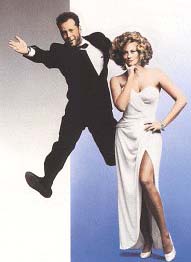 Do
you have any preference, regarding movies, television or documentaries?
Do
you have any preference, regarding movies, television or documentaries?
LH: The challenge
of scoring a movie is there regardless of whether the movie is
for the theater, television, cable or whatever medium. The challenge
is to write a great score that serves and works well for the film.
I love all the mediums because I’ve had great experiences
in all mediums. I like the variety and the versatility. It keeps
the music fresh and ever developing. Naturally, when scoring for
a feature film there are many more resources available to the
composer. Feature films usually have larger orchestras and more
recording time, for instance. However, the challenge of television
is creating even with a tighter budget and less time. You just
have to make that part of the challenge. I don’t mind living
on the edge. I’ve come up with some terrific ideas at the
last minute. My theme for the “Moonlighting” series
I composed and arranged the night before the session. That was
close!
BS:
Which of the current composers do you consider to be at their
best moment? Which other composer's scores have you enjoyed much
recently?
LH: In todays’ film
music world I like the work of Thomas Newman and James Newton
Howard. I like some of the John Williams scores and I think Jerry
Goldsmith was one of the best.
BS:
You told us that Thomas Newman, James
Newton Howard, John Williams and the
deceased Jerry Goldsmith are the most respected
composers by you, nowadays. Could you quote some of their scores
that you specially enjoy?
LH: I loved
Thomas Newman’s scores for “Road to Perdition” and “Shawshank
Redemption” and I was very impressed by James Newton Howard’s
score for “The Village”. Jerry Goldsmith has so many
great scores over the years it’s hard to pick just one.
The diversity of his scores is amazing.Although John Williams
is known for some very major scores, I love some of his lesser
known works like “Presumed Innocent” and “The
Reivers”.
BS:
What can you tell us about your coming projects?
LH: I never
talk about upcoming projects. I always prefer to discuss them
after they are finished and delivered. I’m kind of funny
that way.
BS:
What special project would you like to be involved in, before
your, in a not near future, retirement?
LH: I hope
to create many more film scores. I want to write a grand opera
and definitely some more concertos.
BS:
Finally, could you tell us of another anecdotic situation you
lived along your extense career?
LH: One of
my favorite anecdotes was when Gregory Peck came to one of my
sessions for “Old Gringo”. We just happened to be
scoring the scene where his character, Bitter, takes the General’s
horse and rides out into the night as an act of defiance. I recorded
a take of the cue and came into the control room for a playback.
There I was introduced to Mr. Peck . We played back the scene
with the music. At the end of the playback, Mr. Peck turned to
me and said “Great! Now I finally understand what the scene
is about!”. I will never forget that moment.
BS:
Thank you very much for your consideration. It has been a real
pleasure to talk with you, here in BSOSpirit.
Would you like to send us a few last words for your fans here
in Spain?
LH: I would
love to come to Spain one day and give a concert of my works.
I feel that there is a great artistic surge in Spain right now,
and a great appreciation for the art of our times. Look at the
excellent films that have come out of Spain recently. My Puerto
Rican mother has always talked to me about our heritage and about
her grandparents being from Spain. There is a connection.
Interview
by DDBSpawn (David Doncel) and Oscar
Gimenez





